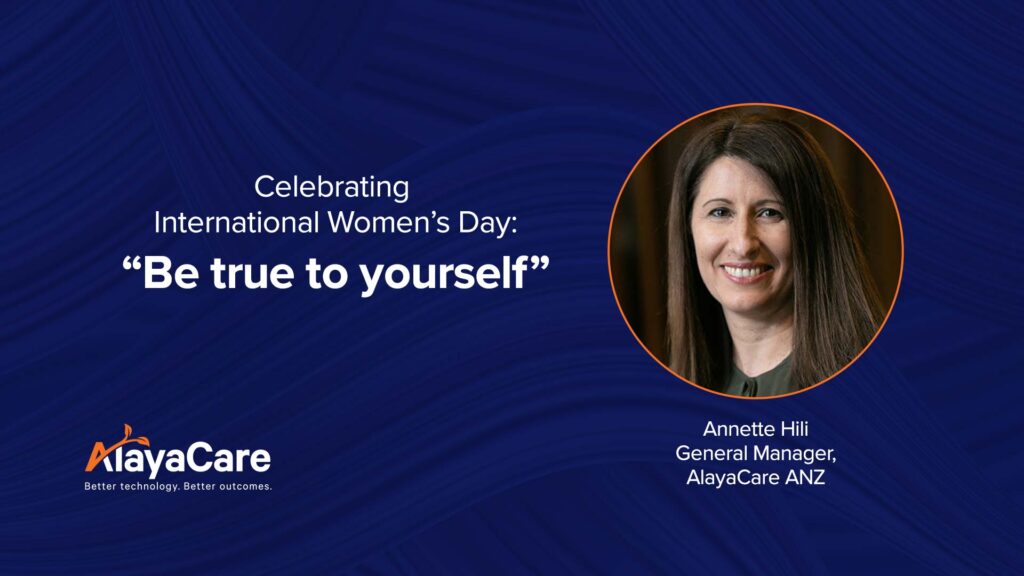Blog
Celebrating International Women’s Day: “Be true to yourself”

As we celebrate International Women’s Day, we are reflecting on the phenomenal achievements of women in business. The General Manager of AlayaCare ANZ, Annette Hili, has broken down many barriers in her career in aged care and leadership. We interviewed her about the lessons she’s learned along the way and her advice for women who are striving towards their goals.
What was your career journey like on your way to AlayaCare?
I graduated from university back in 1996. I did an Honours degree in psychology and had every intention of doing my master’s and then becoming a clinical psychologist. But at the very end of my last year, we had a clinical psychologist come out and speak to us and talk about the role. And I had this moment where I was like, “Oh, I’m not so sure I actually want to do that.” I decided it was probably safer to take a year off, rather than jump straight into my master’s, and go explore the world a little bit and decide what I might do.
I found a position close to home working in youth services, which was a role that seemed quite interesting which led to my first management role. Four years in, I was going to jump to the other side of the fence and go work for the Department of Community Services for a little while. But Baptist Care, who I worked with at the time, came to me with a counter-offer and wanted me to consider a role in aged care.
I can still remember going along to that job interview just to be nice, feeling adamant that I wasn’t going to take the role as I didn’t want to work in aged care. As luck would have it, they really were keen for me to take the position. They said to me, “give us three months, and if you hate the job, we’ll give you your redundancy and you can go.” I thought to myself, “okay, I’ve probably got nothing to lose so I’ll give this thing a whirl.” The site had three aged care facilities and a fairly big retirement village plus a home care service on site.
Honestly, I don’t think I ever looked back. From that very first day when I walked in, I got immersed into the world that is aged care and working with these amazing women who were all registered nurses. It was impossible not to fall in love with what they did because they were so passionate about doing the absolute best for these elderly clients that we cared for. From that point, I was given multiple opportunities because I stayed at Baptist Care for 23 years.
Was leadership something that you actively worked towards, or did it just come your way through opportunities that came your way?
I started as a youth worker, and I ended up as a Chief Operating Officer of a company. I don’t think I would ever have believed if anyone had told me 23 years prior that this would have happened. My intention was to do that youth role for six months and then decide if I was going to go back and do my clinical master’s.
As it turned out, I was on a completely different path to the one I thought I would be on. Instead, I was given all these opportunities to do a lot of on-the-job learning, lots of training alongside it, got into management, and kept jumping around from there.
When it came to leadership, I fought against nearly every role that they wanted me to do in the organization. It was more a case of them saying, “hey, there’s this role here that we think you would be good for,” and me responding with “Oh, I’m not so sure about that.”
I’m the kind of person that when I start something, I really commit to it. I’m driven by the need to finish something off and then I get bored within a certain amount of period once I feel like I’ve done all I can do. But I don’t think I ever really aspired to be in leadership positions. It kind of just happened. And I think along the journey I doubted myself a fair bit, particularly every time there was the next step up.
And what are the challenges, based on your experience, that women face in leadership?
The ones that stand out the most for me, particularly in the early phases of my career, was breaking down the barriers that women could actually be in leadership roles in the first place.
I can still remember a time when I was a property manager, and historically property managers were all male. There had been a restructuring and I’d been appointed into the role. I was sitting at this site, and there were contractors coming in and there was someone from head office who happened to be male. They were directing all the conversation to him, even though it was my site and I was the property manager. I literally had to physically step in front of them and say, “actually, I’ll answer that question for you,” and make them see me.
One of my proudest moments in all those years were one of my maintenance officers came up to me and said “I remember when you started and I looked at you and I thought, ‘she ain’t going to last’, but boy, have you proven me wrong.”
What unique qualities do women bring to leadership roles?
I think having a balance of leaders that are both male and female is important. As women, we have a different approach to men. So, try and remember that you don’t have to be or think like them to get there. We need to hold on to this uniqueness.
Sometimes there is still a bit of a male- dominated culture in certain spaces, but I don’t think we should ever aspire to behave in that manner to be heard. We need to be true to ourselves and how we work through challenges. That is the whole benefit of having a mixed team, right? People bring in different ideas and you bring them all together to produce the best solution.
What advice would you give to women who are looking to become leaders? First and foremost, I would say believe in yourself and that you can do it. And remember to be humble. We don’t achieve anything off our own backs. We achieve this because of the input of every single solitary one of our team members.
I believe servant leadership is important. I once went along to a training session where it talked about taking your organisational chart and flipping it upside down. The most vital roles are the ones down the bottom in a normal org chart so if you flip it, it places these important roles at the top. Success isn’t achieved by any one person, but the whole team.
I think this is eloquently explained by the Center for Servant Leadership:
A servant-leader focuses primarily on the growth and well-being of people and the communities to which they belong. While traditional leadership involves the accumulation and exercise of power by one at the “top of the pyramid,” servant leadership is different. The servant-leader shares power, puts the needs of others first and helps people develop and perform as highly as possible.
Also, I think as females, particularly if you choose to have a family, you’ve got to find a balance. And I know that people love to talk about work life balance. I will argue that there’s no such thing. Something always gives in that equation. You’ve just got to make a decision about which part you’re going to forego. But at the same time, don’t do things because you’re aspiring to get your career moving quickly, because your children are only young for a really short time, and then all of a sudden, they’re adults.
I took time out when I had young children. And even though I took some time out and went part-time for a while, I was still able to progress in my career. Was it a bit later than it would’ve been otherwise? Possibly, but I have no regrets. If I have any regrets, it was that I should have taken even more time in that period because your children are e only young for a short while. It’s tough – that choice between being a working mum, or being a full-time working mum at home caring for your children, or something in between.
What suggestions would you give to women with families who are looking to advance in their careers?
You’ve got to come up with the right balance that works for you and your family and try hard to make it work. And it’s okay whichever way you go. But if you do choose to work full-time in the workforce then making that time to still connect with your family is so important. In the end, I will always argue that family comes first. And you need to manage that balance because nobody else will do it for you. The other thing I’d say is that you need to be true to yourself. Don’t try and be like anyone else. Don’t try and be like the boys. Always have faith in what it is that you bring to the table and use that skill to better whichever role you end up in.
The good leaders that you work with will recognise talent. You will not need to stand on a pedestal and scream how wonderful you are. Good leaders will see it and they will want to promote those people. And they’re the kind of leaders you want to work with. You don’t want to be working with ones that choose who they put into roles because of their gender. That’s not a workplace you want to be in.
I think we’ve still got a way to go to reach gender equality in the workforce. There’s no doubt that we haven’t broken the glass ceiling completely, but we’re in a way better place than we were a few years ago. Things are headed in the right direction, so let’s remain true to ourselves, have faith in our ability and take the wonderful skills we have to whatever role we believe we can add value to.
At AlayaCare, we are an organisation that inspires exceptionalism in all of our people, and our workplace culture is proud to be one that is supportive, inclusive, and diverse. Find out more about working with us here: https://alayacare.com/en-au/careers.


